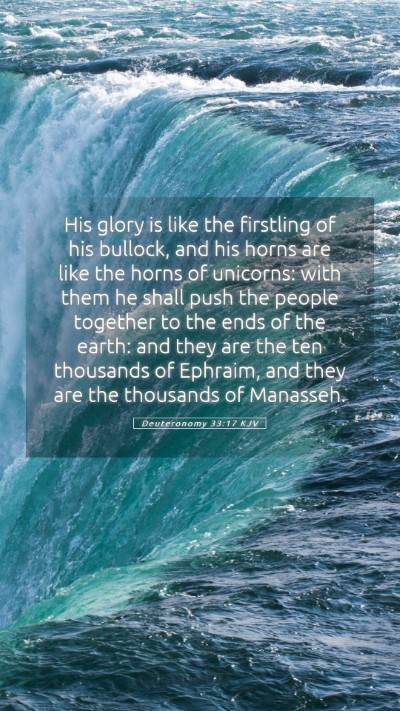Understanding Deuteronomy 33:17
Deuteronomy 33:17 reads, "His glory is like the firstling of his ox, and his horns are like the horns of unicorns: with them he shall push the people together to the ends of the earth: and they are the ten thousands of Ephraim, and they are the thousands of Manasseh." This verse serves as a profound testament to both the strength and the distinct identity of the tribes being addressed, particularly Joseph, which encompasses Ephraim and Manasseh.
Verse Context and Importance
This verse is part of Moses’ final blessings upon the tribes of Israel before his death. Here, Joseph is metaphorically described through imagery of power and might. It speaks to the blessings that God has bestowed upon him and his descendants.
Commentary Insights
-
Matthew Henry's Commentary:
Henry emphasizes that the blessings given to Joseph symbolize both strength and fecundity. The imagery of the ox, celebrating his first offspring, highlights the promise of prosperity and growth within the tribe. It signifies a time of unrivaled blessing and reflects the divine favor that Joseph received, which was evident in his fruitful lineage.
-
Albert Barnes' Notes:
Barnes notes the significance of the "horns" as symbols of strength and power, particularly when noting that they are likened to those of a unicorn, a creature typically seen as formidable in ancient texts. This allusion signifies Joseph's capability to lead and defend the people of Israel. His descendants are depicted as a powerful military force, capable of overcoming opposition and unifying the tribes.
-
Adam Clarke's Commentary:
Clarke elaborates on the description of Joseph as possessing a glorious and robust strength that transcends mere physicality. He interprets the "ten thousands of Ephraim" as a representation of a vast and prosperous nation that would arise from Joseph's lineage, inferring a future where these tribes would wield great influence in Israel’s history.
Theological Implications
This verse embodies the theological themes of divine blessing, strength in unity, and the significance of heritage in the life of the Hebrew people. The tribe represented by Joseph, especially through Ephraim and Manasseh, symbolizes the hope for abundance and divine favor. The imagery suggests that through God’s guidance, they would possess the strength to conquer and thrive.
Application for Today
In accessing the meaning of Bible verses such as Deuteronomy 33:17, it is essential to reflect on how these lessons apply to contemporary life. This verse exemplifies the impact of communal strength and the importance of recognizing the blessings that come from God. In Bible study groups or online Bible study sessions, this verse can facilitate discussions regarding personal and communal blessings, empowerment through faith, and the strength found in unity.
Cross References
- Genesis 49:22-26 - Jacob's Blessing of Joseph
- Numbers 1:32-35 - The Census of the Houses of Joseph
- Joshua 17:14-18 - The Inheritance of the Josephite Tribes
Conclusion
In summary, Deuteronomy 33:17 provides rich insights into the nature of God’s blessings, the significance of strength, and the unique role of the tribes of Ephraim and Manasseh in Israel's narrative. The understanding of Scripture, particularly through the lenses of established commentaries, enriches our Bible study insights, offering profound theological reflections applicable to today's believers.


